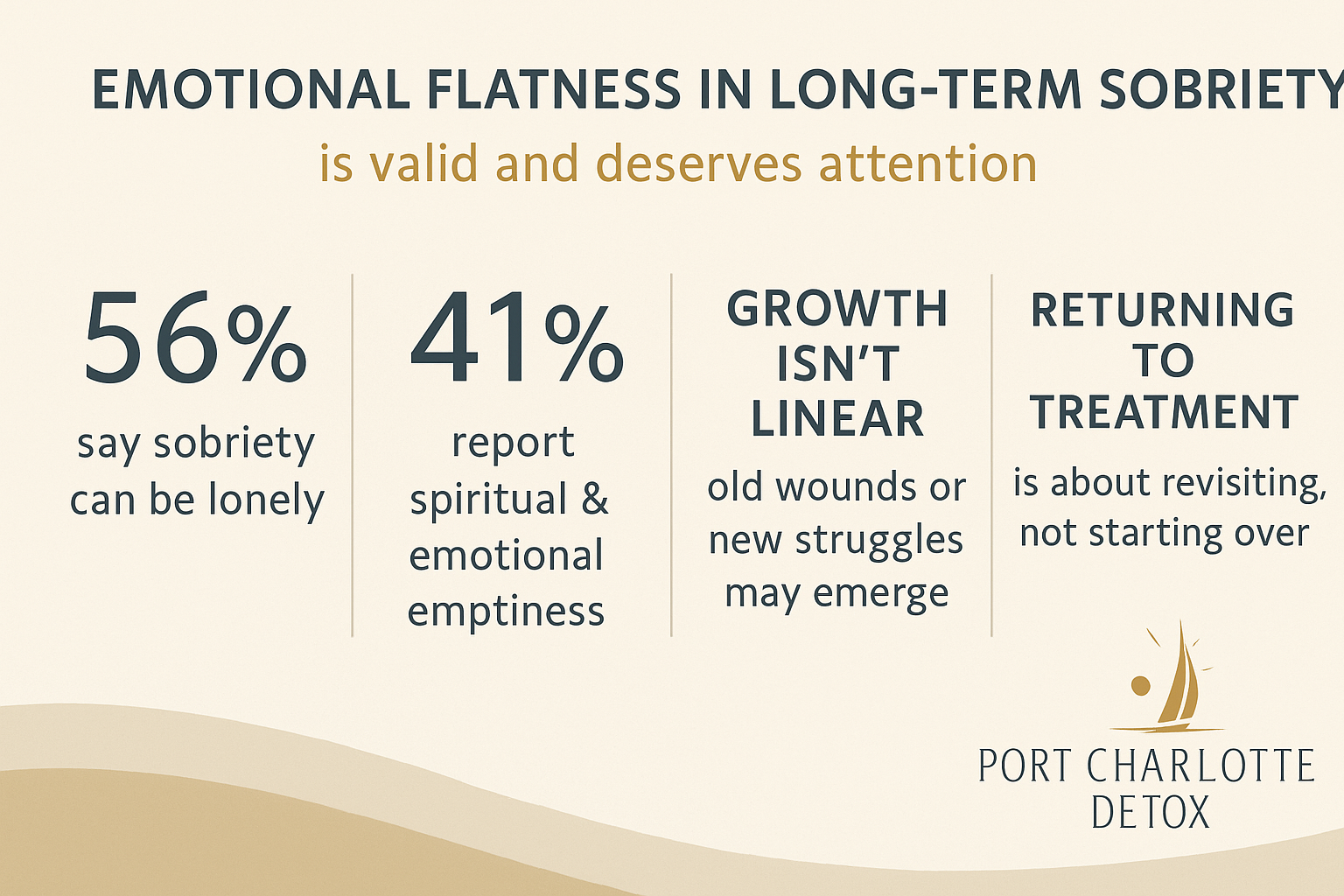Sobriety is supposed to feel like freedom—but lately, it might feel more like going through the motions. You’re not using. You’re not in crisis. But you’re not okay, either. If you’re a long-term alum who’s starting to feel emotionally flat, it’s not a failure—it’s a signal. And sometimes, the strongest thing you can do is re-engage, especially through a supportive residential treatment program in Port Charlotte.
It’s Not “Just a Phase.” Emotional Flatness Deserves Attention
Let’s say it out loud: sobriety can get lonely.
Not socially—necessarily—but spiritually, emotionally. The intensity of early recovery fades. You’re not dodging triggers with every breath. You’ve probably rebuilt some things—your health, your job, your relationships. And yet, in the quiet of it all, you’re wondering:
Why don’t I feel better?
This isn’t about relapse. It’s about the emptiness that creeps in when the fire that carried you through early recovery burns out. The rituals might still be there—meetings, steps, routines—but the spark is missing. If that’s where you are, please know this: it’s valid. You’re not making it up. You’re not “ungrateful.” You’re not doing anything wrong.
Growth Isn’t Linear—And Neither Is Treatment
The expectation that we “graduate” from healing is one of recovery culture’s most harmful myths.
In reality, the deeper layers of grief, shame, and identity work often don’t surface until later—when we’re stable enough to hold them. So if you’re noticing old wounds resurfacing, or new emotional struggles rising that you can’t explain, that’s not regression. It’s readiness.
Returning to treatment isn’t about fixing what’s broken. It’s about revisiting what was left untouched.
And it’s not the same experience the second (or third) time around. You’re not walking in blind this time. You’re walking in aware—with insight, history, and a better sense of what you need. For many long-term alumni in Florida, choosing a residential treatment program in Charlotte County isn’t about crisis—it’s about connection.
What Returning to Residential Treatment Actually Looks Like
If your mind jumped to detox floors and group introductions, take a breath.
Re-engaging with residential treatment as a long-term alum is a different experience. You’re not starting from zero—you’re deepening the work.
At Port Charlotte Detox, we often see returning clients come in not because they’ve relapsed—but because they’ve plateaued. They’re not in chaos, but they’re not at peace. They’re emotionally dry. They want more.
Here’s what returning can actually offer:
- Space to step away from routine and listen to what your mind and body are trying to tell you.
- A deeper layer of therapeutic work, especially around trauma, identity, relationships, or spiritual disconnection.
- A safe place to ask bigger questions, like: “What does a full life look like for me now?”
- Guidance that honors your lived experience—not lectures or rehashing step one.
In other words, this isn’t rehab for beginners. It’s sanctuary for the weary.
You Don’t Have to Be Falling Apart to Ask for More Support
One of the biggest blocks for long-term alumni is the feeling that they have to justify the need for help. After a year or more sober, the idea of re-entering treatment can feel like failure—like an unspoken rule is being broken.
But here’s the truth: the longer you stay sober, the more nuanced your emotional world becomes. And the more pressure you might feel to keep it together, even when you’re quietly unraveling.
So let’s break the stigma.
- Needing support again doesn’t mean you failed. It means you’re honest.
- Returning to care isn’t a step back. It’s a step toward alignment.
- Wanting more from life isn’t selfish. It’s recovery, evolving.
The Spark Doesn’t Just Come Back—You Have to Go Find It
If you’ve been white-knuckling through meetings, routines, and spiritual practices that no longer feel alive to you… it’s time to pause.
The goal isn’t to force the old spark back. It’s to create space for a new one.
Sometimes that means unplugging from daily survival mode and returning to a place where you can get quiet, listen, and be supported. Not because you’re falling apart. But because you deserve more than maintenance-mode.
You deserve clarity. Creativity. Connection.
And those don’t come from pushing harder—they come from resting deeper.
“I thought I had to be in crisis to come back. But this time, it wasn’t about survival. It was about finally breathing again.”
– Returning Residential Client, 2023
Common Reasons Long-Term Alumni Return to Treatment
You’re not alone in feeling this. Here are some of the most common (and valid) reasons we see alumni return to residential care:
- Emotional burnout from “doing all the right things” but still feeling flat
- Spiritual disconnection—a sense that recovery has lost its meaning
- Unprocessed grief or trauma that surfaces later in sobriety
- Relationship patterns that mirror old behaviors, despite being sober
- A desire to go deeper—not just stay sober, but feel whole
If you’re nodding along to any of these, that’s not a coincidence. That’s your system asking for more than maintenance. It’s asking for reconnection.
Returning for You—Not for Optics
Let’s be honest. There’s a lot of pride in long-term recovery. And with that pride can come pressure.
Pressure to “be the example.” Pressure to hold it together for others. Pressure to perform wellness even when you’re quietly unraveling.
You don’t owe anyone an explanation for re-entering treatment. You don’t need to tell your sponsor it’s a “backslide.” You don’t need to justify anything.
You’re allowed to prioritize yourself.
FAQs: Returning to a Residential Treatment Program After Long-Term Sobriety
Do I have to relapse to qualify for residential treatment again?
No. Many clients return without relapsing. Feeling disconnected, emotionally flat, or needing deeper therapeutic work is reason enough. If you feel off, that’s valid.
Will I have to go through detox again?
Not necessarily. Detox is only part of the process if there’s active substance use or medical need. If you’re sober, you may enter directly into residential-level care focused on emotional and mental health.
What if I’ve been through this program before?
That’s actually a strength. Familiarity can help you dive deeper, not rehash the basics. Our team at Port Charlotte Detox tailors your care plan based on where you are now—not where you were last time.
Will I be treated like a new client?
No. We honor your experience. Treatment for returning alumni is often more focused, individualized, and insight-driven. You’re not starting over. You’re leveling up.
How long should I stay?
It varies. Some clients return for a few weeks of structured reset. Others stay longer to do deeper therapeutic work. We’ll work with you to decide what’s best.
If You’re Feeling This, Don’t Wait for a Breakdown
There’s a quiet tipping point in recovery when you realize: maintenance isn’t enough anymore.
If you’re there—if the spark has faded and you’re not sure how to get it back—listen to that. You don’t have to crash to earn a reset.
Whether you’re based locally or looking for a residential treatment program in Fort Myers, FL, Port Charlotte Detox offers a place to land softly, reconnect meaningfully, and begin again—with no shame.
Ready to reignite your recovery?
Call (844)336-2690 or visit our residential treatment program services in Port Charlotte, Florida to learn more.



